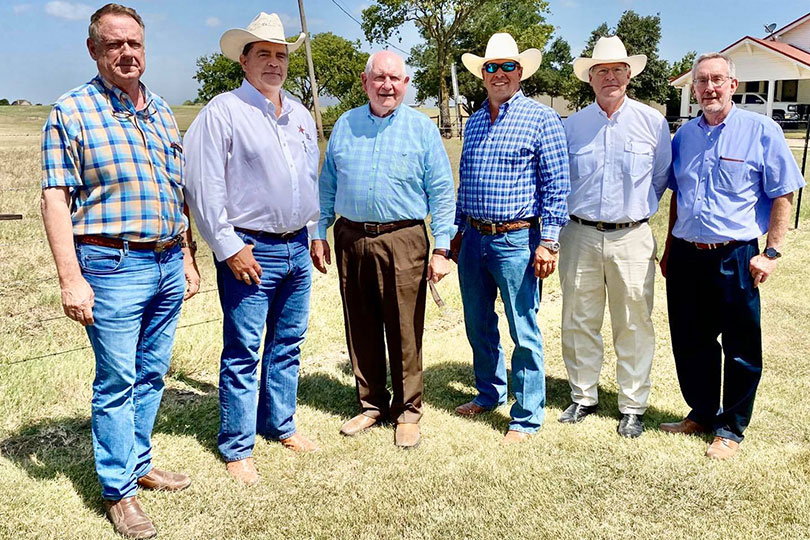By Julie Tomascik
Editor
Volatile markets, uncertainty and the need for additional funding for agriculture were among the topics covered during a July 16 roundtable with U.S. Sen. John Cornyn and U.S. Secretary of Agriculture Sonny Perdue.
Years of declining farm income and a prolonged trade war, coupled with the COVID-19 pandemic, has negatively impacted all sectors of agriculture. That was the message shared by Texas farmers and ranchers during the event at Ging Cattle Company in Coupland.
“Farm and ranch families across the state greatly appreciate the coronavirus assistance provided, but in nearly every sector of agriculture, farmers and ranchers have seen their markets shrink or even disappear,” Texas Farm Bureau (TFB) Vice President Zack Yanta said. “We appreciate Sen. Cornyn, Secretary Perdue and Congressman John Carter for making this trip and to hear directly from farmers and ranchers about our concerns and our needs as we move forward in this pandemic.”
To date, more than 24,000 Texas farmers and ranchers have received payments totaling $304 million through the Coronavirus Food Assistance Program, which was announced by the U.S. Department of Agriculture in April.
“The coronavirus has placed an unprecedented strain on commodity markets, our food supply chain and our ability to continue operating our farms and ranches,” Yanta said. “As farmers and ranchers in Texas and across the U.S. continue to weather this pandemic, we need additional assistance.”
A report released by Texas A&M University’s Food & Agricultural Policy Center (AFPC) estimates $6-$8 billion in possible losses for Texas agriculture without intervention or price recovery.
Yanta stressed that USDA work to reevaluate the losses on livestock and crops and renew funding for those impacted by the pandemic from mid-April through at least mid-July.
“Most major agricultural sectors in Texas—including livestock, cotton, wheat, corn, soybeans and specialty crops—have seen significant drops in the market,” Yanta said.
Other concerns addressed during the roundtable included replenishing the Commodity Credit Corporation (CCC) funding and providing additional funding for cow-calf and stocker operators.
While the recent Coronavirus Aid, Relief, and Economic Security Act (CARES) Act provided the CCC with a $14 billion replenishment, industry analysts say that won’t be enough, citing USDA’s need to address the wide-ranging adverse economic effects of COVID-19 on U.S. farmers and ranchers.
The CCC’s borrowing limit has remained flat since it was set in 1987. If the borrowing limit were adjusted for inflation, the limit would be $67.5 billion. On behalf of TFB, Yanta requested $68 billion for the CCC to help provide USDA with additional financial resources needed to stabilize and support farm income and commodity prices.
Live cattle futures plummeted 30 percent due to COVID-19, and cattle producers have experienced major price swings since the beginning of the pandemic.
“Many cow-calf and stocker operators held their cattle in hopes of market recovery. These ranchers, myself included, endured significant costs from declining market prices, feeding animals, land rental and the breakdown of the beef supply chain,” Yanta said.
He noted USDA needs to provide more than $33 per head on inventory and consider opening Conservation Reserve Program grazing.
Assistance for contract poultry growers, mohair producers and ensuring agricultural labor needs are met were also discussed during the roundtable.
While other livestock sectors have received needed assistance through CFAP, poultry farmers were excluded. Current estimated losses to contract poultry growers are estimated at $750 million nationwide for 2020.
The $4.65 million U.S. mohair export sales in 2019 have dropped to zero so far in 2020 because mohair processing mills in South Africa were closed due to COVID-19 restrictions. In 2019, 80 percent of the spring shear was already sold. These ranchers have already paid the cost of shearing and maintaining their livestock with no income in 2020.
Tough economic hardships are facing Texas farmers and ranchers, but Perdue and Cornyn say more financial assistance could be possible.
“Farming is a challenging industry, even in good years,” Perdue said. “COVID-19 has been a shock to the system overall in every sector, and agriculture, unfortunately, was not spared in that. I know [Congress] is considering another proposal, and we have a request there for the rest of 2020 for the agricultural sector.”
Texas is one of the top agricultural production states, leading the nation in cattle and calves, cotton, sheep and goats.
“One thing I think we’ve learned through this whole coronavirus episode is how efficient and effective our producers are, because not very many people say any interruption in the food supply chain for food that comes from the producers directly to our retail stores and to our families,” Cornyn said. “And that’s a great credit to everybody who keeps Texas fed.”
TFB, along with Sen. Cornyn’s office, coordinated the meeting, and representatives from Texas & Southwestern Cattle Raisers, Texas Cattle Feeders, Plains Cotton Growers and Southwest Council of Agribusiness were in attendance, as well as Texas Agriculture Commissioner Sid Miller.

